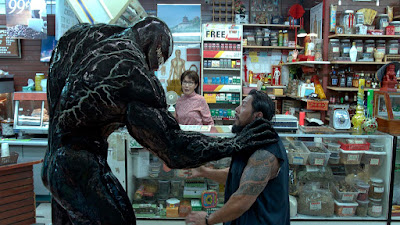For a solid third of its running time, “Venom” keeps pace with a premise that has almost ingenious ramifications. The hook comes when Eddie Brock, a San Francisco journalist regarded for his activist approach against corrupt corporate entities, is thrust into a situation that exposes him to an alien parasite, and they bond – both anatomically and intellectually – while outrunning hitmen hired by a local capitalist. Immediately the mind is filled with all the obligatory curiosities: how does the alien “symbiote,” a shapeless heap of goo, manage to communicate with its host in its native language? Why is it more ideal for it to use him rather than any number of other potential hosts to achieve its agenda? Does he have any weaknesses, or is he basically an object of chaos without limitation? Any basic knowledge of science will instantly supply plausible enough answers to negate the skepticism, and we watch admiringly as two personalities banter with one another like peers engaged in a war of sarcasm. But then their union is thrust into a series of action sequences that are shot like senseless riots; while this “Venom” is rushing through the busy streets trying to outrun a wave of gunmen, the photography whooshes frantically without stability, blurring the details until we can barely register what has transpired. What use is there, ultimately, in spending time with a fascinating anomaly like this if the mere notion of his physical ability is undermined by an image that knows nothing of pace?
Wednesday, October 17, 2018
Thursday, October 11, 2018
BlacKkKlansman / **** (2018)
Ron Stallworth never perceived himself as having a “white voice,” but something about its candid inflection transcended the stereotype of black men speaking in the “jive” style of the early 70s. Spike Lee emphasizes this with unassuming assurance in the early scenes of “BlacKkKlansman,” showing us a man who is anchored by no particular sense of manner or distinction; he is simply an everyman seeking a place in the world, without much regard to whether he might be crippled or undermined by his ethnic background. Others are consciously aware of his presence, primarily, by the conditioning of their upbringing, but that’s of little surprise; he may be one of the only African Americans in a backwards Colorado town to ever walk into a police headquarters seeking a career in law enforcement. Some will come to regard him favorably after his capabilities are made known, while others will use their ignorance to blind them to his accomplishments. And though the film will tell the story of a man whose skill allowed him to successfully infiltrate the top ranks of the Ku Klux Klan, this is primarily about how injustice rebounds like an unpredictable pendulum, especially when it is controlled by men living in arrogance of their own privilege.
Thursday, October 4, 2018
The House with a Clock in Its Walls / *** (2018)
The young hero of “The House with a Clock in Its Walls” is one of the more unfortunate examples of the literary trap we now know as young adult pathos. He adopts a trend that can be described as such: if you’re a prepubescent eccentric who engages better with daydreams then actual people, it’s inevitable for the story to make you the victim of immense grief before dropping you into a life-threatening adventure. And in the tradition of the displaced orphans of “A Series of Unfortunate Events,” poor Lewis Barnavelt arrives at the opening of the tale not eager or excited by what he is about to experience, but crippled by the horrific knowledge that his parents recently died and left him in the custody of a virtual stranger. How can he possible be roused to enthusiasm, then, by the strange and ambitious whimsy going about all around him? Are the likes of an eccentric uncle played by Jack Black and a female accomplice played by Cate Blanchet enough to undermine his sorrow? Or is the pain under the surface the sort that negates all the wonder and joy that ought to come with the discovery? A straight document of these events might contrast the of the scenario with the psychological disconnect of the characters, but what fun would that be when a world of magic possibilities is just waiting to be unleashed?
Subscribe to:
Posts (Atom)



